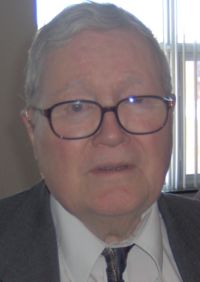- Gordon Tullock
-
Gordon Tullock Public choice 
Born February 13, 1922
Rockford, IllinoisNationality United States Institution George Mason University Field Law and economics
Public choice theoryAlma mater University of Chicago Influences Henry Calvert Simons
Duncan Black
Ludwig von MisesContributions Rent-seeking Gordon Tullock (born February 13, 1922) is an economist and retired Professor of Law and Economics at the George Mason University School of Law. He is best known for his work on public choice theory, the application of economic thinking to political issues. He is one of the founding figures in his field.[1]
Contents
Early Life and Education
A native of Rockford, Illinois, Tullock attended the University of Chicago and, after a break for military service during World War II, received a J.D. in 1947. Following a brief period in private practice, he joined the Foreign Service that fall. After completing training, he was posted to Tianjin, China, later receiving Chinese language instruction at Yale and Cornell and follow-on postings to Hong Kong and Korea. He resigned from the Foreign Service in 1956.[2] While he originally intended to pursue a career as a foreign trader in the Far East, his work on The Politics of Bureaucracy eventually led him to begin collaboration with James M. Buchanan at the University of Virginia while Tullock worked at the University of South Carolina teaching international studies.[3]
Academic career
Tullock's collaboration with Buchanan produced The Calculus of Consent: Logical Foundations of Constitutional Democracy (1962), which quickly became a seminal work in the new field of public choice. He later joined Buchanan as a faculty colleague at Virginia. For four years Buchanan and Tullock continued their research program, even founding a new journal for their field (1966), first called Papers in Non-Market Economics and eventually titled Public Choice, where they invited articles applying economic theory to all sorts of non-market phenomena, especially in the realm of government and politics. Despite the success of the book and the journal, disagreements with the UVA administration eventually led Tullock to leave.
In 1967, Tullock identified many of the concepts of what came to be known as rent-seeking in a seminal paper.[4]
Tullock moved to Virginia Polytechnical Institute (now called Virginia Tech) in 1968 and was joined by Buchanan a year later. There they continued the Public Choice Society and the journal, of which Tullock remained editor until 1990. At VPI, Tullock wrote a number of influential articles and books, including Private Wants, Public Means (1970), The Logic of the Law (1971), The Social Dilemma (1974), and The Vote Motive (1976).
In 1983, Tullock and the Center for Study of Public Choice moved to George Mason University, at the time a relatively unknown school in Fairfax, Virginia. Tullock taught and GMU from 1983–1987 and at the University of Arizona from 1987-1999. He continued to publish widely (more than 150 papers and 23 books in all), including Autocracy (1987), Rent Seeking (1993), The Economics of Non-Human Societies (1994) and On Voting: A Public Choice Approach (1998). In 1999 he returned to George Mason as a Professor of Law and Economics, where he retired in 2008.
Awards and Recognition
In 1994 Tullock was awarded an honorary Ph.D. from the University of Chicago and in 1998 became a distinguished fellow of the American Economic Association. He served as President of the Southern Economic Association, the Western Economic Association and the Public Choice Society. In 1996 he was elected to the American Political Science Review Hall of Fame. He is sometimes considered a longshot candidate for the Nobel Memorial Prize in Economic Sciences.[5]
Criticism
His book, The Politics of Bureaucracy, has been criticized for overlooking a substantial body of literature.[6] A number of authors have criticized Tullock and the public choice tradition as being too simplistic in its explanation of political behavior.[7]
References
- ^ Public Choice, Vol. 71, [1], 1991. Retrieved on 2011-04-17.
- ^ Tullock, Gordon, Curriculum Vitae, October 2000. Retrieved on 2010-07-25.
- ^ http://www.lewrockwell.com/orig4/tullock1.html
- ^ Tullock, Gordon (1967). "The Welfare Costs of Tariffs, Monopolies, and Theft". Western Economic Journal 5 (3): 224–232. doi:10.1111/j.1465-7295.1967.tb01923.x.
- ^ http://economics.about.com/cs/nobelwinners/p/tullock.htm
- ^ Kaufman, H (December 1966). Administrative Science Quarterly 11 (3). JSTOR 2391168.
- ^ Friedman, Jeffrey (1996). The Rational Choice Controversy: Economic Models of Politics.
External links
Categories:- 1922 births
- Living people
- People from Rockford, Illinois
- American economists
- University of Chicago alumni
- George Mason University School of Law faculty
- Public choice theory
Wikimedia Foundation. 2010.
